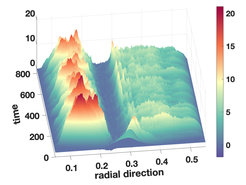Otto Hahn Medal for IPP junior scientist
Dr. Alessandro Di Siena honored for his pioneering work on the interaction between fast plasma particles and turbulence
The Max Planck Society has awarded the Otto Hahn Medal to Dr. Alessandro Di Siena from the Tokamak Theory Division at Max Planck Institute for Plasma Physics in Garching. The award is intended to motivate particularly talented young scientists to pursue a later university or research career.

In a series of groundbreaking theoretical investigations, Alessandro Di Siena, currently a postdoctoral researcher at the University of Texas at Austin, USA, has revealed the existence and nature of stabilizing effects that fast plasma particles can have on turbulence in fusion plasmas. The small plasma vortices transport particles and heat outward from the hot plasma center to the colder edge, thus degrading the thermal insulation of the magnetically confined plasma. Therefore, to increase the energy output of a future fusion power plant, it is an important goal to understand, predict and be able to influence this “turbulent transport”.
Alessandro Di Siena made his discovery by skillfully combining sophisticated analytical calculations with gyrokinetic simulations on some of the world’s most powerful supercomputers. The result was a clear picture based on two novel physical mechanisms – first, a resonance between the fast particles and the plasma instabilities driving the turbulence, and second, a nonlinear interaction between different plasma instabilities, some of which are excited by the fast particles. Using reduced analytical models that capture the essence of these mechanisms, Alessandro Di Siena also participated in the development of experimental studies investigating whether turbulence in plasma can be suppressed by fast particles. The result was a new and improved confinement mode in the ASDEX Upgrade tokamak at Garching.
Every year, the Max Planck Society awards the Otto Hahn Medal to young scientists for outstanding achievements in their doctoral work. It comes with prize money of 7500 euros.
